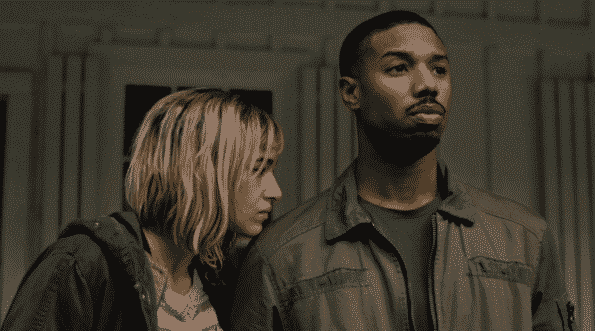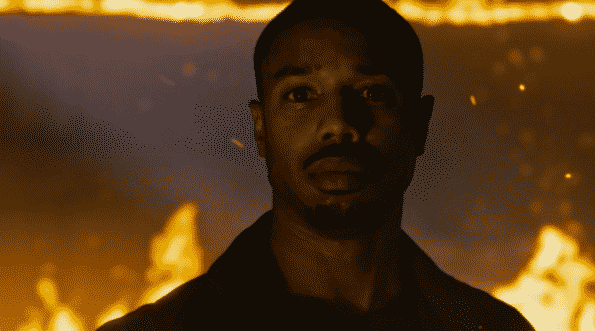Fahrenheit 451 – Recap/ Review (with Spoilers)
While you understand the point Fahrenheit 451’s tries to make, it seems in the pursuit of making a point it was forgotten to make the film entertaining. Director(s) Ramin Bahrani Screenplay By Ramin Bahrani, Amir Naderi Date Released 5/19/2018 Genre(s) Book Adaptation, Action, Drama Noted Actors Guy Montag Michael B. Jordan Beatty Michael Shannon Yuxie (Voice)…

Spoiler Alert: This summary and review contains spoilers.
Additionally, some images and text may include affiliate links, meaning we may earn a commission or receive products if you make a purchase.
While you understand the point Fahrenheit 451’s tries to make, it seems in the pursuit of making a point it was forgotten to make the film entertaining.
| Director(s) | Ramin Bahrani | |
| Screenplay By | Ramin Bahrani, Amir Naderi | |
| Date Released | 5/19/2018 | |
| Genre(s) | Book Adaptation, Action, Drama | |
| Noted Actors | ||
| Guy Montag | Michael B. Jordan | |
| Beatty | Michael Shannon | |
| Yuxie (Voice) | Cindy Katz | |
| Clarisse | Sofia Boutella | |
Summary
In an undisclosed year, generations after a 2nd American civil war, books have largely been banned to appear all sides. No more books to offend Black people, feminist, and even those who are white who don’t like being portrayed a certain way. Now the government controls everything you can read and puts it on the Dark 9. A new internet which tracks everything you do or read. Which was formed with the help of tech companies who added their assistance in the form of the watchdog known as “The Ministry.” Thus allowing them all the data they could want, with a great amount of help from the almost standard Yuxie system that seems to be in nearly everyone’s home or office.
Leading us to the focus of the film, Guy Montag. Since he was a child he has been raised by a man last named Beatty. Someone who trained him to be a fireman. Not of the kind most of us know today, but someone who starts fires. Mostly to destroy material which pushes you to think or feel. So no Harry Potter books, art, Mozart, or anything like that. Kids think its evil, some adults have a warped view of history, and those who know better are handled appropriately.
However, there comes a point where Guy is allowed to flirt with a book, thanks to Beatty, as well as a young woman named Clarisse who is what is known as an Eel: People who value old media, such as books, and try to make the information widely available once more. They are branded as terrorists and hunted. Not killed, but with fingerprints the main source of identification, the punishment is their prints getting burned and making it so, for years, their mobility and lives are limited.
But, thanks to a fire leading Guy to find and read a book, combined with Clarisse’s guidance, Beatty’s loyal “dog” begins to stray. In fact, he may be a key to the revolution known as Omnis. That’s if he can survive.
Other Noteworthy Facts & Moments
Question(s) Left Unanswered
- Did the transponder tip-off Yuxie to where Guy was and where he was going?
- Did Beatty kill Montag’s father or have him arrested? In other words, was he the one who snitched and turned him in?
Collected Quote(s) or .Gifs
I’ve been burned so many times I don’t know where my scars end and my body begins.
Highlights
The Tech Visuals Were Interesting
Perhaps the sole thing which was noteworthy, in a positive way, was when it came to the tech of the film, while not on the level of a theatrical release, it was interesting. Especially taking note of how the media was used for the sake of propaganda.
On The Fence
The Whole Film Felt Very Barebones

Taking note I didn’t read the book, I just watched the Thug Notes overview and saw Michael B. Jordan and thought, why not? I came in knowledgeable but far from an expert. So, with that said, while I got the point of the film dealing with censorship and how technology plays a role in that, setting that aside, this was a boring movie to get through.
First and foremost, Guy, even with Jordan’s talent, barely evolves past being a generic soldier who learns the truth. Same goes for Beatty who, while clearly there is an author in him screaming to get out, there is a certain lack of complexity in both which seems strange given the subject matter. In fact, a lot of the time I found myself wanting to compare this to The Handmaid’s Tale and question why Beatty didn’t have an almost Aunt Lydia or Serena Joy nuance? Why is it that, despite him seemingly interested in the old ways of life, maybe enjoying sneaking a book on the rare occasion, that aspect isn’t pushed more? The conflict of living in a world where he can’t enjoy what he loves but also recognizing the chaos is what led to a family members death.
What also doesn’t help this movie is that the film squarely relies on these two to carry it. Which, to me, was a bit of a mistake for I don’t see Shannon nor Jordan as the type who play off each other well. Also, while Jordan has proved himself as a leading man in Fruitvale Station and Creed, he strangely seems dependent on a charismatic co-star to really shine. The same goes for Shannon who, like Jordan, can be known to be a bit of a scene-stealer, but with neither actor challenging the other nor having the chemistry needed to push this father/son, mentor/mentee vibe, it all falls flat.
That is, alongside its attempts to shine a light on how this future could happen. Oh, and the weak romantic subplot that makes you want to roll your eyes. Especially since, from what it seems, it was made for the movie and doesn’t play out as we see in the book.
Overall: Mixed (Divisive)
With the birth and explosion of Netflix as a platform, they have taken a lot of HBO’s thunder. They now have a lot of the series you’d expect on HBO before its birth. The comedy specials that HBO surely would have had if Netflix didn’t exist no longer appear under their banner, and arguably HBO has tried to compete. Which, in the case of Big Little Lies, amongst specials like Notes From The Field, they have shown they are not down and out.
However, with Fahrenheit 451, it seems the glory days of HBO original movies being acclaimed and conversation starters could possibly be behind us. And while they won’t become the next Blockbuster, one does have to wonder if the best days of the network is behind them and like many other networks, they cannot compete with new media as much as be even more calculated in its risks and try to survive on a few tentpole projects vs. being the maverick it once was.
Leading to why the Mixed label. Fahrenheit 451 seems like the type of production which was more about broad strokes of the point and establishing visuals than being entertaining or insightful. If not, the film tried so much to dumb down the content of the book, it eventually found itself being a representation of what perhaps would be allowed on the Dark 9. Just before The Ministry did some minor editing to show how terrible and ludicrous the media of yesteryear were.
Follow Wherever I Look on Twitter or Like us on Facebook.
Check Out Other Movie Reviews
Images used for editorial and commentary purposes. All rights remain with their respective copyright holders.



